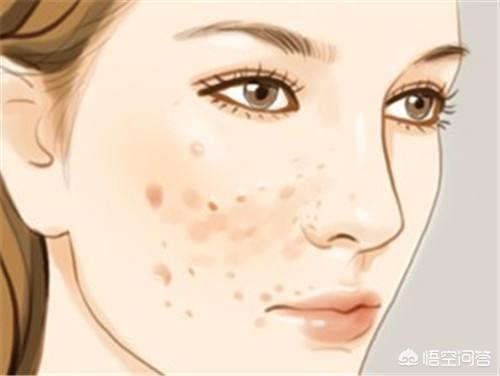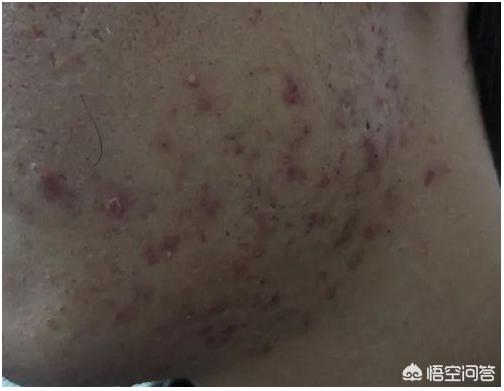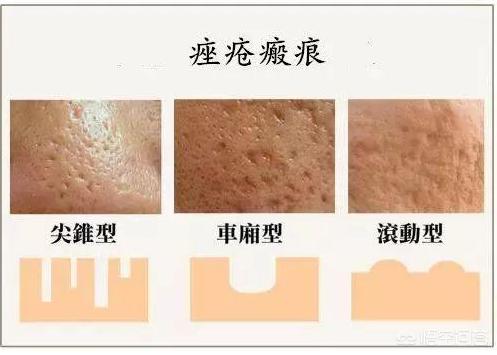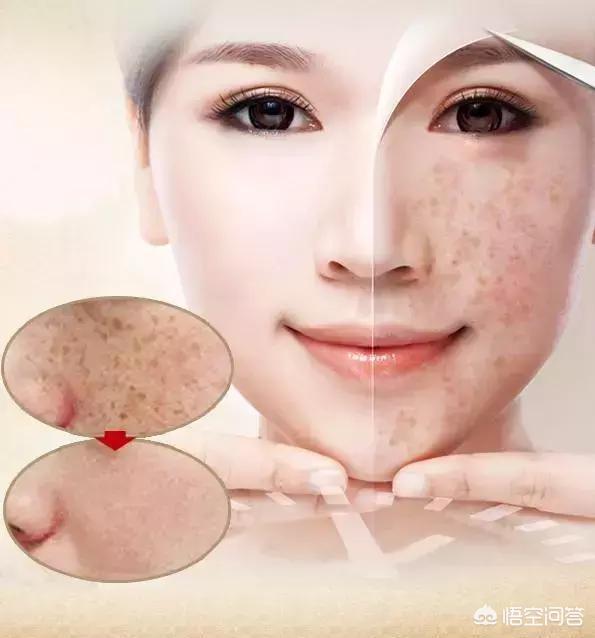Does acne leave scars when it clears up?
Whether or not you will scar after acne is related to a number of factors. First is the type of acne, or severity. Second is the way you treat it, laser, needle picking, hand squeezing. Again, it's the medication, and whether it was appropriate and timely. Lastly, is the aftercare care in place. Don't go to the doctor if you are sick and miss out on your future.
My daughter's did not leave scars, red marks slowly went down, first of all, pay attention to a hygiene, do not get infected, do not eat stimulating food, do not use hormone products, to the regular hospital dermatology consultation.
Those that injure the hair follicle usually leave a scar.
With the burn a reason, the burn is divided into three degrees, once red second degree bubble third degree meat rotten, second degree and divided into light second degree and heavy second degree, in general, heavy second and third degree has been injured to the hair follicles, will leave scars, one degree and light second degree will not.
Scars are a world problem and often stay with people for the rest of their lives.
Scar removal is commonly done with injections, fillers, surgery, and topical creams.
For scars that are relatively small and not severely hyperplastic, topical creams are safer and usually do not bring about secondary scarring. However, the formula, ingredients and process of the cream are more demanding.

In time, there will be no scars. Most people have had them.
Scarring or not, it depends, of course.
Except for rare cases of scarring.
Most acne scars in general are atrophic scars that
Mostly due to pustular acne inflammation invades too deep and for a long time is not good, affecting the repair of the skin, leaving atrophic scars
There is also a part of the hand, repeatedly picking and squeezing their own skin, especially not to the pus stage of the inflammation of acne, resulting in inflammation for a long time does not subside, which is also more likely to leave a scar
that amount or more
is the more common cause
It's worth saying that with today's medical treatments, acne scars can be improved very well, but as good as they are, they can't disappear completely
the reason why
You must not pick and squeeze your pimples too often
Once acne is severe, it is important to treat it as soon as possible
Depending on your body type, some people will have scars after acne has cleared up, while others will not have any marks. There is no need to worry about leaving scars as there are medications that can be applied to make the scars smooth and clean.
Whether acne will leave a scar after it is healed, the first thing depends on whether you have squeezed it or not, and whether it has a wound or not. Only the skin has a wound, become a bar scar, will flow to leave a scar, if and did not go to squeeze, the skin is not broken, then the skin grows well is good, there is a possibility that will not leave a scar. And, it also has to do with their own skin, and diet, such as eating some of the color more heavy things, then the possibility of leaving a scar will be a little bit bigger.
The reason why scars form when the skin is recovering is because the epidermis of the skin and those tissues inside the dermis, grow at different rates. So different people's skin recovery situation is different, different human body constitution, the same reason for the breakage, some people may not leave scars, some people will leave scars. So it's not a certainty that you're going to get a scar or not.
{!-- PGC_VIDEO:{'thumb_height': 640, 'file_sign': 'a4ed1470acf69b19db2fa50a7f8142aa', 'vname': '', 'vid': 'v02019070000bk7gjer6936n3t4t2qrg', 'thumb_width': 360, 'vu': 'v02019070000bk7gjer6936n3t4t2qrg', 'src_thumb_uri': '2818e00037899b5b1c295', 'sp': 'toutiao', 'update_thumb_type': 1, 'vposter': 'http://p1.toutiaoimg.com/origin/1e0660006a68092d9e13c', 'video_size': {'high': {'duration': 60.6, 'h': 854, 'subjective_score': 0, 'w': 480, 'file_size': 3563070}, 'ultra': {'duration': 60.6, 'h': 1280, 'subjective_score': 0, 'w': 720, 'file_size': 6854775}, 'normal': {'duration': 60.6, 'h': 640, 'subjective_score': 0, 'w': 360, 'file_size': 2519193}}, 'duration': 60.6, 'thumb_url': '1e0660006a68092d9e13c', 'thumb_uri': '1e0660006a68092d9e13c', 'md5': 'a4ed1470acf69b19db2fa50a7f8142aa'} --}
Nowadays, 40% of young people in China have acne problems of different degrees. The mechanism of the onset of the disease is like this, androgen increase, resulting in excessive secretion of sebaceous glands, leading to abnormal keratinization of the pore opening, which is blocked and infected by bacteria. All other claims are flimsy.
Follow "Pi Mei" daily to bring you the knowledge of plastic surgery and cosmetic science, to answer your questions about beauty!
First we need to understand what acne scars are.
What are acne scars?
Acne scars are caused by the inflammatory response, and endocrine disruption of the hair follicles, sebaceous gland units and their surrounding tissues during the onset of acne vulgaris, resulting in blockage and inflammation of the hair follicles and sebaceous glands, and scarring during the recovery process. Studies have shown that male patients, patients with a family history of scarring, and patients with more severe acne inflammation are more likely to develop scars.

2 Classification of acne scars?
Clinically, we can categorize acne scars according to their presentation: depressed scars, hyperplastic scars, polymerized acne, necrotic acne, cornified necrotic acne, and tropical acne.
Among them, depressed scars are the most common, which can be categorized into pointed cone type, carriage type and rolling type. Clinically, a clear diagnosis and accurate typing is needed to accurately choose the treatment method.

How to treat acne scars instead.
In the early stages of acne scar formation, many people do not have enough knowledge about it and still treat the scars the same way they treat acne, which, if not treated properly, can easily cause irritation, triggering the proliferation and enlargement of the scars.
If the scars are not large and numerous, they can be treated with drug injections plus superficial radiotherapy. The injections serve to flatten the scars and the superficial radiotherapy serves to further repair the tissue and inhibit proliferation and recurrence.
If improper or untimely treatment results in the enlargement of the scar growths, some of which may be contiguous, treatment becomes more difficult. That's when a combination of surgical treatments is needed.
Nowadays, the treatment methods for acne scars include image-beam laser, laser resurfacing, and complex skin rejuvenation.
1. Through the focused micro-image beam laser technology, it produces nearly one hundred uniformly arranged micro-laser light columns, each of which is only micrometer in size. When acne scars are treated with image beam laser, only the acne scarred part of the skin's surface is affected by the laser, while other normal tissues are not affected in any way. The preserved portion of the skin that is not affected by the laser accumulates more collagen and active enzymes, which speeds up the healing process by several times, and the patient quickly returns to normal work and life in a very short period of time.
2. Removing facial acne scars by laser grinding is a restorative procedure that grinds the superficial layers of the epidermis and dermis to improve their skin defects and treat certain diseases. After the affected area is ground, its surrounding normal skin turns inward, and the remaining skin appendages hair follicles, sebaceous glands, and sweat glands proliferate to rapidly form new epidermis, leaving little to no scarring after treatment.
3, composite color light rejuvenation system in the blue light is very high purity, penetration is very strong, but does not harm the normal skin. It targets the sebaceous glands, acts on the sebaceous glands, reduces oil secretion, shrinks the pores and thus removes the basis for acne scars to arise; secondly, the blue light can kill the propionate bacillus and chaffeicolous spores that cause acne scars, and the combined effect of the two aspects makes acne scars fade, and the effect is more significant.
The best treatment for acne scars also depends on the individual's specific situation and needs, and more attention should be paid to improving one's endocrine and skin hygiene in daily life. Specific repair methods should go to a regular hospital to find a professional scar specialist to do the appropriate consultation.

What can I do to prevent acne scars?
1. Facial cleansing:
Dust, skin excretions, and bacteria can adhere to the surface of the skin, and all of these substances can block the opening of the hair follicle, so it is very important to pay attention to skin cleansing.
2. Dietary attention:
Take a light diet, avoid spicy, oily and fried stimulating foods, and keep your bowels clear.
3. Regularity of work and rest:
Adequate sleep plays an important role in maintaining skin renewal and function.
4. Notes:
Avoid squeezing the affected area with your hands, so as not to cause pus and inflammation, and form scars and pigmentation after the abscess breaks and absorbs, affecting aesthetics.
Hello and thank you for your question!
Acne is a skin disease that affects the appearance of the skin, especially if it is not properly cared for or the acne is severe, it can have a great impact on the patient's skin aesthetics, so will acne leave scars after treatment? This is what acne patients are most worried about and want to know, in fact, acne scars, depending on the specific circumstances, some may leave scars, while some can slowly return to normal skin color, the following to learn more about it.
1, ordinary acne, which in acne patients, belongs to the most common one, ordinary acne in general after puberty will slowly reduce the symptoms until disappeared, will not leave any traces, only a small number of pustules, nodules, cysts patients, in the good will leave depressed or hyperplastic scars.
2, infantile acne, this kind of acne usually occurs in 3 to 12 months of male infants, most of them have obvious family history, lesions occur in the face, manifested as blackheads, pimples and pustules, there are also a few manifested as nodules and cysts, if it is a blackheads can be disappeared in a few weeks, pimples and pustules can be resolved in 6 months, can be left behind a small depressed scars.
3, corn necrotic acne, this kind of acne is caused by acne secondary staphylococcal infection, lesions are mainly concentrated in the forehead hairline, its symptoms are blisters, pustules, such as improper care, may leave scars after the good.
4, necrotizing acne, it is also caused by staphylococcal secondary infection, usually occurring in young people aged 30 to 35 years old, most often in the forehead hairline, serious cases can also occur on the chest and back, lesions mainly papules, the top can have umbilical concave, pus formation after pustulation, necrotic, and this kind of acne is often left behind after good depressed scar.
5, polymerization of acne, this type of acne is more common in men, mainly in the face, chest and back and other parts of the skin lesions for a variety of acne coexist, such as pimples, papules, or pustules, cysts, pus can be formed after the breakthrough of the fistula, aggregated and fusion of large nodules, etc., so that the patient's skin is greenish-purple color, this is the most harmful, after the good will be left behind serious scars.
The above is the introduction of whether acne will leave scars, it can be seen that different types of acne, the impact is not the same, some of which can leave scars, while some can slowly return to normal skin after the good, the patient can be based on their own type of acne to determine whether or not it will leave scars, but it is important to note that, no matter what kind of acne, with the hands or other tools to squeeze, it can lead to aggravation of acne, and will increase the chance of hyperpigmentation and scarring, so be careful not to squeeze and scratch acne. Therefore, acne should not be squeezed or scratched.
This question and answer are from the site users, does not represent the position of the site, such as infringement, please contact the administrator to delete.